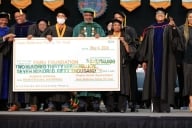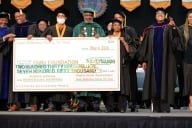You have /5 articles left.
Sign up for a free account or log in.
WASHINGTON -- For more than a year, higher education organizations have urged Congress to somehow avoid the “fiscal cliff” -- the dramatically named combination of spending cuts and tax hikes that will take effect Jan. 2 if lawmakers cannot agree on a plan to reduce the deficit and extend expiring tax cuts and benefits.
As details of some possible plans emerge, though, so has a new area of concern for higher education: proposals to eliminate or limit tax deductions for charitable giving, especially for the wealthiest Americans.
In the deal to raise the debt ceiling last year, Congress agreed to reach a long-term agreement on deficit reduction in November 2011. Because that effort failed, deep cuts to domestic and defense spending -- including an 8.2 percent cut for federal spending on research, and for some financial aid programs -- will go into effect Jan. 2. At the same time, the Bush-era tax cuts expire, as do a host of tax provisions that are traditionally extended, such as benefits for college savings accounts and tuition expenses.
Congressional Democrats and President Obama favor letting the tax cuts expire for people making more than $250,000, raising tax rates on the highest earners. Congressional Republicans oppose such an increase. As a counteroffer, they have proposed increasing tax revenue without raising tax rates by limiting tax deductions and closing loopholes.
Those proposals, including some developed by the Committee for a Responsible Federal Budget, could include a cap on itemized deductions for wealthier Americans, or reducing the value of tax deductions for those paying the highest tax rates. Deductions are currently based on the tax rate: a donor paying the top marginal tax rate of 35 percent and giving $1 million can deduct 35 percent of that gift, or $350,000, from his or her adjusted gross income. Some proposals, including past budget plans from Obama, have suggested lowering the amount that is deductible to 28 percent.
The deduction for charitable giving costs about $52 billion in tax revenue per year -- about half the cost of the mortgage-interest deduction, the largest and among the oldest of such deductions.
But colleges and universities, and their lobbyists here, are arguing that any change to the charitable deduction, or a move to cap deductions as a whole, could discourage giving and prove devastating for higher education budgets and fund-raising. Colleges received just over $30 billion in donations in 2011, and the largest gifts most colleges receive are typically made with awareness of tax benefits.
Lobbying against the proposal has been intense: more than 200 representatives of nonprofits, including many from colleges, gathered on Capitol Hill on Wednesday to urge lawmakers to oppose any plan to alter charitable deductions.
The opposition has also given a more barefaced and blunt look than usual at fund-raising for colleges and universities. Fund-raisers usually emphasize the intangible benefits that motivate their biggest donors -- passion for the university’s mission; a desire to help students like themselves or to make a lasting contribution. But on Wednesday, they focused on the incentive of lower taxes. Even tweaking the charitable deduction could have serious consequences, they argued.
“There’s just no question that it will hurt charitable giving,” said Charles Phlegar, vice president for alumni affairs and development at Cornell University, who was in Washington on Wednesday to lobby the New York State delegation. Even the uncertainty surrounding possible changes to the tax code has been detrimental, he said.
Fund-raisers are perhaps most concerned by proposals to cap the amount that wealthier Americans can deduct at $25,000 or $50,000 per year. Of the three most popular deductions -- mortgage interest, charitable giving and state and local taxes -- only charitable giving is voluntary, they say. If taxpayers reach the deduction cap based on their mortgage and other taxes, they might opt not to give. “If there were a change in the treatment of charitable deductions, the people who would be hurt by that are not the donors -- it’s the recipients of the contributions,” said John Lippincott, president of the Council for the Advancement and Support of Education.
Colleges, even more than other nonprofits, rely heavily on wealthy donors who give six- or seven-figure gifts for fund-raising campaigns. At California State University-Fresno, which is nearing the end of a $200 million fund-raising campaign, more than 35,000 people donated to reach the goal, said Peter Smits, vice president for university advancement. But about $140 million of that sum came from fewer than 20 donors.
Wealthy donors are also more likely to have complicated taxes, and to use their gifts to maximize their tax benefits.
Several fund-raisers and other higher education leaders say they have already heard from big donors who are concerned about the rumors of changes to the tax code. Among the University of Kentucky’s “most significant” donors, there is “deep concern” about any change to how charitable donations are deducted, said Eli Capilouto, the university’s president.
President Obama, who made increasing tax rates on the wealthy a centerpiece of his re-election campaign, is advocating for higher rates rather than eliminating deductions. (He has supported more modest changes in the past, such as reducing the proportion of a charitable donation that can be deducted.) In an interview with Bloomberg TV this week, he specifically cited the impact on fund-raising by higher education that such a change would have. He said that the Republican proposal relied on the deductions being "completely eliminated," adding that "if you eliminated charitable deductions, that means every hospital and university and not-for-profit agency across the country would suddenly find themselves on the verge of collapse. So that's not a realistic option."
It’s unclear whether Congress and the White House will reach an agreement by the end of the year. Even if the spending cuts and tax hikes take effect in January, though, there will be little noticeable immediate impact, and any deal is likely to be retroactive.
So far, colleges and higher education lobbying groups have been very concerned about the budget uncertainty, but have found themselves advocating more strongly against mandatory cuts or tax code changes than in favor of alternative options. The American Council on Education is not taking a position on higher tax rates, and most other associations have followed its lead on urging Congress to reach an agreement preserving their priorities without indicating what solution they might prefer. The Association of American Universities and the Association of Public and Land-grant Universities have, however, repeatedly urged Congress to reach a compromise balancing tax reform and entitlements and avoiding further cuts to discretionary spending.
“We’re certainly cognizant of the challenges that Congress and the White House face in trying to get to a balanced budget,” Lippincott said. “We don’t think that they get there by changing the formula for the charitable deduction.”








